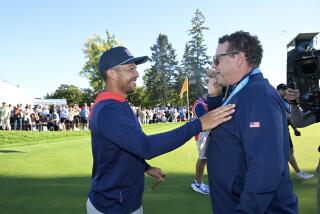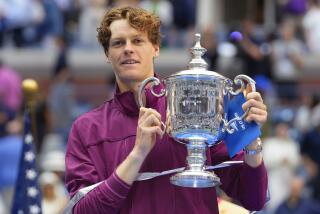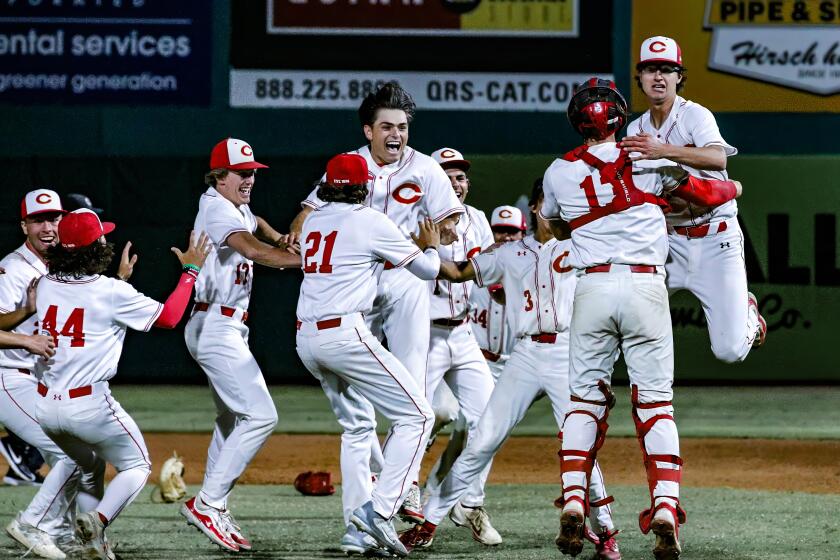A Not-So-Funny Thing Happens to Becker En Route to McEnroe
- Share via
NEW YORK — The tennis match of this year’s U.S. Open, this year, period, and maybe the last five years was canceled Monday . . . due to a lack of Boris.
Everybody wanted to see a quarterfinal showdown at Flushing Meadow between Boris Becker, Wimbledon’s teen-age titlist, and John McEnroe, the long-standing ruler of the sport.
Everybody.
Becker. McEnroe. Tennis writers. Tennis fans around the world. Even people who, until last week, thought tennis was the guy who played catcher for the great Oakland A’s teams of the 1970s.
Everybody except Joakim Nystrom.
And his dissenting vote was an important one. Nystrom, Becker’s opponent in the round of 16, was the only man alive capable of keeping a Becker-McEnroe drama off Broadway and out of prime time. And, by returning serve with other-worldly proficiency and tattooing the white lines with laser-precise groundstrokes, Nystrom succeeded in throwing a Swedish wrench into the entire works--wiping out the West German prodigy in four sets, 6-3, 6-4, 4-6, 6-4.
So much for history. So much for the most eagerly anticipated tennis match since Bjorn Borg’s 1980 Wimbledon encounter with McEnroe. So much for CBS’s plans to break into its Wednesday evening schedule for a telecast.
McEnroe kept his part of the deal, opening the day’s round of matches with a 6-3, 7-5, 6-2 triumph over Czechoslovakia’s Tomas Smid. Afterward, he spent most of his press conference discussing Becker and the much-hyped confrontation that finally appeared a lock.
Only as an aside did McEnroe’s thoughts turn to possibility of having Nystrom as his quarterfinal opponent.
“It would be a different type of match,” McEnroe said. Then, feigning disappointment in his voice: “It would be, ‘Ohhhh, he’s playing Nystrom.’ ”
Nystrom played the spoiler’s role to the hilt, but his victory was not totally unexpected. He may be the most anonymous of the current Swedish fleet--he doesn’t have Mats Wilander’s results, he doesn’t have Stefan Edberg’s power game, he didn’t play Davis Cup--but those who know tennis know of Nystrom.
He’s ranked No. 11 in the world, he owns a 1985 victory over McEnroe (at Dallas) and against Becker at Wimbledon, he served twice for the match before losing a 9-7 fifth set. Rino Tommasi, the Italian tennis broadcaster who writes the daily pre-match notes in the U.S. Open program, predicted a Nystrom decision over Becker in straight sets.
In 2 hours and 45 minutes, Nystrom turned that forecast of victory into cold, hard fact.
Nystrom won by capitalizing on Becker’s sleepwalk through the first two sets and holding on to capture a fourth set that ended with rousing play on both sides--and questionable judgment by the backcourt linesman and Becker on match point.
With Nystrom holding advantage on the match’s final game, he served, took Becker’s return deep and sent back a forehand that appeared to land inches beyond the baseline.
At least Becker thought so. He watched passively as the ball skipped by him--then dropped his racket in disbelief when no “out” call was made.
But that was the extent of his protest. Immediately, he snatched up his racket and jogged to the net to shake Nystrom’s hand.
Later, in the interview room, someone suggested that Becker should have acted just as quickly on that final shot. Considering the importance of the point, why didn’t he at least take a swing, even though he figured the ball was long?
“I have no idea,” he said.
It was an error in decision--and maybe of youth--for the 17-year-old Becker. And it wasn’t his first of the match.
“The ball was out, but it does not matter. There were too many mistakes in the match,” Becker said.
“The first two sets, I wasn’t on the court. . . . I didn’t play tennis in the first two sets. Finally, the crowd started cheering, and I started fighting.”
An accurate appraisal. The wunderkind looked more like dunderkind as Nystrom built a two-set lead in barely an hour. For once, Becker began to act his age--missing first serves, hitting second serves with timidity and spraying his backhand all over the place. For once, he seemed to sweat under the glare of the bright lights.
But he didn’t collapse. While the lasting image of Becker’s first trip to the U.S. Open will remain that final point--with the kid idly watching the bouncing ball--it would be incorrect to imply that the Wimbledon champion went down without a fight.
Nystrom would have never needed that final forehand had Becker not got his back up once it was pressed up against the wall. In the fourth set, Becker fought off four match points in a heroic ninth-game stand and warded off another in the 10th before finally yielding.
In that ninth game, Becker double-faulted as he fell behind, 30-40, before surviving Match Point No. 1 when Nystrom botched an easy cross-court volley.
Becker snuffed Match Point No. 2 with a blistering service winner. He staved off No. 3 with a desperate lunge at the net and a spectacular backhand volley he dunked at an impossible angle. He erased No. 4 with a booming ace.
Eventually, he closed out the game with consecutive service winners, pulling to within 5-4 and pulling the Stadium Court spectators out of their seats in roaring appreciation.
That great athletic intangible, momentum, seemed ready to swing. Becker won the first three points of the 10th game, holding triple break point, but then miss-hit a lob, a service return and a forehand. Deuce.
Nystrom then assumed advantage with a cross-court approach shot Becker could not run down. Match Point No. 5.
Becker rallied again with an acrobatic backhand overhead at the net to force deuce. Nystrom countered with another approach that hit the tape and dribbled over to set up Match Point No. 6.
On his sixth try, Nystrom sent the script for The Boris and Mac Show through the paper shredder.
Nystrom was on center stage now. But, when the spotlight shined his way, Nystrom did nothing to dispel the stereotype that the Swedes are men of action, not words.
Was this his greatest triumph?
“I think beating McEnroe in Dallas was my best win,” Nystrom said.
Was he bothered by the hype and the assumption that there would be a Becker-McEnroe meeting in the quarterfinals?
“I think it was good for me because I didn’t feel the pressure, and Boris is the one who had all the pressure. It was more difficult for him.”
Did this victory avenge his loss to Becker at Wimbledon?
“Of course, especially since I think I played my best grass-court match ever there. In Wimbledon, I served for the match twice and lost, so this feels great.”
What about replacing Becker as McEnroe’s next opponent?
“Well, I will try to do my best. I know it will be very difficult.”
Becker won at Wimbledon with a poise and a maturity that amazed even McEnroe, not one who’s easily impressed. At the lowest point of his young career, during his losing press conference at the U.S. Open, Becker displayed those same qualities.
“I lost, you know, and I would be a lot happier if I won the match,” he said. “Of course, I’m disappointed. I wanted to play McEnroe in the quarterfinals. But Joakim is a good player, and he gave me a lot of trouble both times we played. He has got one of the best returns in the game and his passing shots are very good.
“I played bad. It’s a credit to Joakim--he played good tennis. It was a good match.”
So, The Match of the Half-Decade will have to wait. Maybe next year.
“Hopefully,” Becker said, “I will be playing the Open in ‘86, where I can do better.”
By then, he’ll be older and wiser. By then, he’ll be all of 18.
More to Read
Go beyond the scoreboard
Get the latest on L.A.'s teams in the daily Sports Report newsletter.
You may occasionally receive promotional content from the Los Angeles Times.










